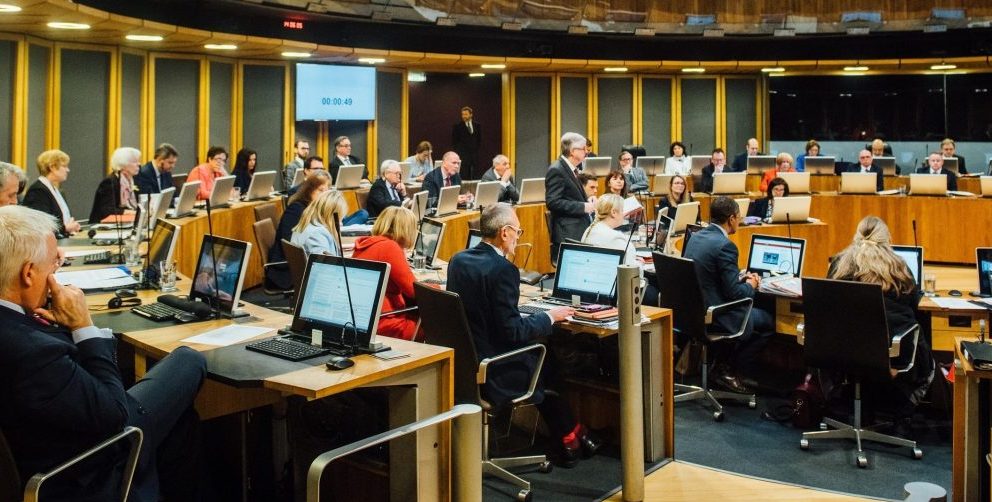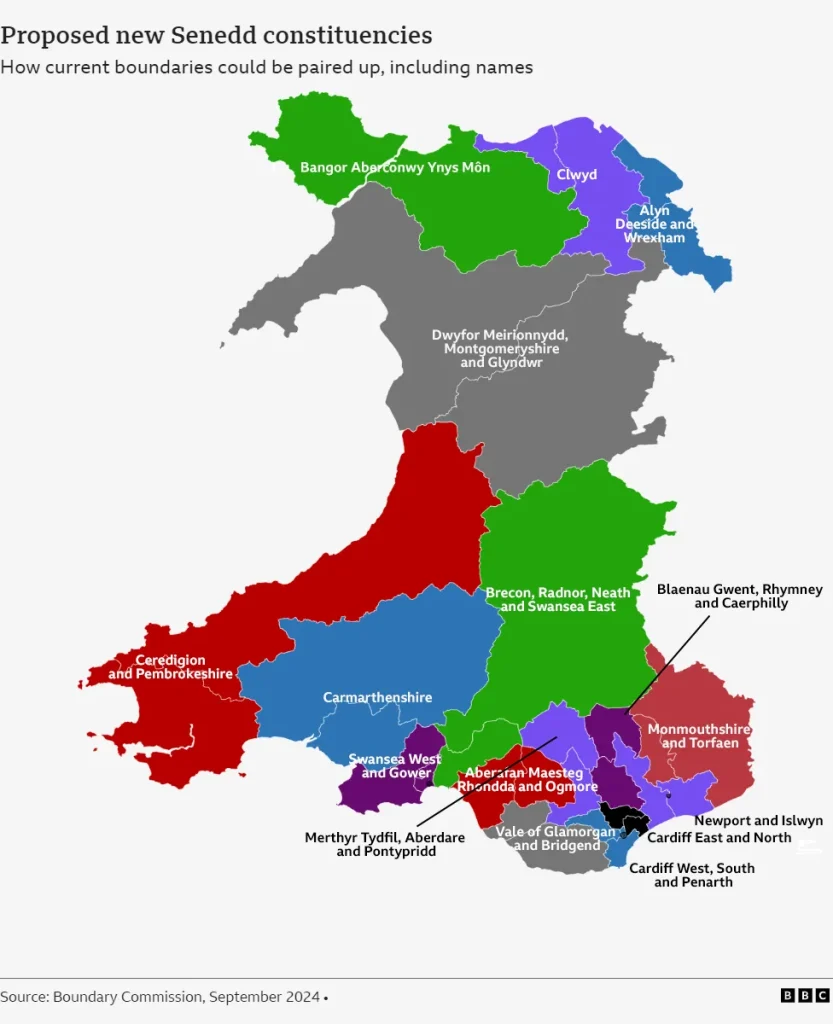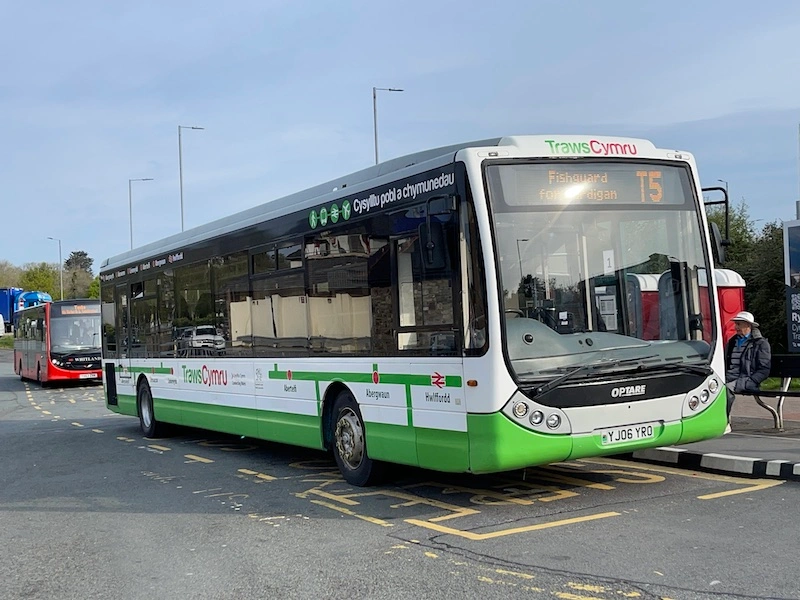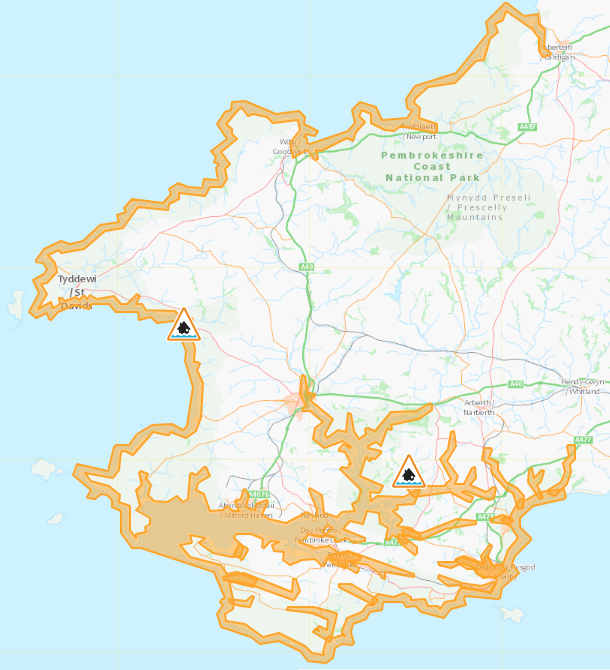News
Proposals to redraw Wales’ political landscape ahead of 2026 Senedd election

A HUGE new constituency stretching from the Llŷn Peninsula on the west coast to the Welsh border with England is among the proposals set to reshape the Senedd election in 2026. This comes as part of a broader reform that will see the Welsh Parliament grow to 96 Members of the Senedd (MSs) from the current 60, with a new voting system and a drastic redrawing of the electoral map.
The changes, outlined by the Democracy and Boundary Commission Cymru, follow a mandate to create 16 new, larger constituencies by merging the existing 32 Westminster seats. This reconfiguration will lead to the creation of vast constituencies, some covering nearly 2,000 square miles, as well as smaller, more densely populated urban areas.
The new electoral map represents a profound departure from the existing structure, with the 16 proposed constituencies representing a doubling up of the recently redrawn Westminster boundaries. This approach was adopted to meet the tight timeline ahead of the next Senedd election in 2026, avoiding the need to draft entirely new boundaries from scratch. Each of these new constituencies will elect six MSs through a party-list proportional representation system, replacing the current mixed system of first-past-the-post and regional lists.
The largest proposed constituency, Dwyfor Meirionnydd, Montgomeryshire, and Glyndŵr, will span a vast area of 1,927 square miles, stretching from the Llŷn Peninsula in the west to the border with England, and encompassing parts of Gwynedd and Powys. This will be a significant change for the residents of these areas, who will see their representation in the Senedd combined across a broad and diverse geographic area.

In contrast, urban areas such as Cardiff East and North will be more compact, reflecting the higher population density in these regions. The smallest of the proposed constituencies, Cardiff East and North, will cover just a fraction of the area of its rural counterparts, yet will still elect the same number of MSs.
The Boundary Commission’s proposals are not yet set in stone. A public consultation is currently underway, running until 30 September 2024, allowing residents and stakeholders to have their say on the new boundaries. The commission has emphasised that it has taken into account factors such as transport links, local ties, shared history, and the Welsh language in drawing up the proposals, aiming to create constituencies that feel as natural and representative as possible.
The proposals are expected to be revised in December 2024, with the final boundaries to be confirmed by March 2025. However, these changes are intended to be temporary, with plans for a more comprehensive review of the boundaries before the subsequent election in 2030. This future review is expected to allow for more flexibility in creating constituencies that better reflect the changing demographics and political landscape of Wales.
The expansion of the Senedd and the introduction of the new voting system are the culmination of years of debate and planning, spearheaded by former First Minister Mark Drakeford and ex-Plaid Cymru leader Adam Price. The reforms aim to address long-standing concerns that the current size of the Senedd is insufficient to effectively scrutinise the Welsh Government, given its growing responsibilities since devolution.
While Welsh Labour and Plaid Cymru have supported the expansion, the Welsh Conservatives have voiced strong opposition, citing the increased cost of an additional £18 million per year on top of the Senedd’s existing £67 million annual budget. The new system’s reliance on closed party lists, where voters choose a party rather than individual candidates, has also sparked concerns about the potential erosion of the connection between voters and their elected representatives.
Professor Laura McAllister, an expert in Welsh politics, has warned that the closed lists system could concentrate too much power in the hands of political parties, potentially undermining public trust. Critics fear that this could weaken the bond between constituents and their MSs, as voters would no longer have the option to vote for a specific individual who best represents their interests.
As Wales prepares for the 2026 Senedd election, the changes to the electoral map and the expansion of the Welsh Parliament represent a significant moment in the evolution of Welsh democracy. The introduction of a more proportional voting system is intended to better reflect the will of the electorate, but it also brings with it challenges in terms of representation and voter engagement.
One of the most significant tests for the new system will be voter turnout. Historically, turnout in Senedd elections has been relatively low, with the 2021 election seeing a turnout of just 46.6%. Whether the changes will inspire greater engagement or lead to further voter apathy remains to be seen.
The final shape of Wales’ political map for 2026 is still in flux, and the coming months will be crucial in determining how these changes will impact the future of Welsh politics. With the commission urging the public to participate in the consultation process, the voices of Welsh voters will play a key role in shaping the new constituencies that will define the next chapter of the Senedd.
Community
Wales launches plan to become ‘Carer Aware’ nation

Consultation invites unpaid carers across the country to shape new national strategy
THE WELSH GOVERNMENT has unveiled plans to make Wales a “Carer Aware” nation, with a new public consultation launched today (Monday, Feb 2) aimed at improving recognition and support for the country’s thousands of unpaid carers.
Ministers say the move is designed to ensure people who look after relatives, friends or neighbours are identified earlier and treated as partners in decisions about the care of their loved ones.
A draft National Strategy for Unpaid Carers has been developed with input from hundreds of carers and representative groups across Wales. It sets out eight key priorities, including better recognition of carers’ roles, improved access to respite and short breaks, stronger wellbeing support, and measures to prevent young carers from carrying too much responsibility.
Under the proposals, carers of all ages and backgrounds — including disabled carers and those in minority communities — would be able to access clear, local information and help when they need it.
Officials say earlier identification is critical, so carers can receive advice, financial guidance and emotional support from the start of their caring journey, rather than only at crisis point.
The strategy also stresses the need for sufficient alternative care arrangements to allow carers time to rest and protect their own health.
Dawn Bowden, Minister for Children and Social Care, said many carers do not even see themselves as carers.
“Too often, unpaid carers go unrecognised – even by themselves. They’re simply ‘looking after mum’ or ‘helping out a friend’, but caring can have a profound impact on people’s finances, careers, health and wellbeing,” she said.
“We want Wales to be a place where carers are identified early, where they know their rights, and where they’re treated as partners for the person they care for.
“This consultation is important in shaping a strategy which takes into full account how carers feel and how they’re supported. I’d encourage everyone with an interest to provide their views.”
The consultation is open now and runs until April 13, with responses helping to shape the final strategy and future support services across Wales.
People can take part online via the Welsh Government website.
News
Bus services reform becomes law across Wales

Landmark legislation gives public sector greater control as rollout set to begin in southwest Wales in 2027
LOCAL bus services across Wales are set for their biggest overhaul in decades after new legislation formally became law this week.
The Bus Services (Wales) Bill received Royal Assent on Monday (Feb 2), with the Welsh Government saying the changes will transform how routes are planned and delivered, putting passengers and communities ahead of profit-led timetables.
The legislation was sealed at a ceremony in Cardiff by First Minister Eluned Morgan, marking what ministers describe as a “historic day” for public transport.
The law gives the public sector a stronger role in shaping bus networks, allowing services to be designed around local needs in both rural and urban areas. Instead of relying solely on commercial operators deciding routes, councils and regional bodies will be able to coordinate and plan services more directly.
The Transport for Wales will work alongside local authorities, Corporate Joint Committees, bus companies, unions and residents to redesign networks using local knowledge.
Buses remain a vital link for many communities, particularly in rural parts of west Wales where alternatives are limited. They connect people to jobs, schools, hospitals and town centres.
Eluned Morgan said: “This is a historic day for public transport in Wales – it sends out a clear message that we are committed to improving the bus system and delivering better, more reliable services for the people of Wales.
“Buses are lifelines for many communities across Wales connecting people to jobs, health services, education and friends, and I’m excited to see the improvements that are coming.”
Cabinet Secretary for Transport and North Wales, Ken Skates, said the changes marked “the beginning of a new era”.
He added: “These changes won’t be seen overnight, it’s going to take time, but we are working closely with the industry and local authorities to plan and deliver bus services to meet the needs of passengers today and for generations to come.”
The rollout will be phased, starting in southwest Wales in 2027, followed by north Wales in 2028, southeast Wales in 2029 and mid Wales in 2030.
Ministers say the aim is to deliver more reliable timetables, better coverage and services that reflect what communities actually need – rather than what is most commercially viable.
Community
Flood alert issued for Pembrokeshire coast this evening

Pembrokeshire residents are being urged to prepare for possible flooding along the coastline between St Dogmaels, Cardigan and Amroth, after Natural Resources Wales issued a Flood Alert.
The alert warns that rising water levels could pose a risk to homes, vehicles and livestock, and advises people to take precautions now. Authorities are reminding residents to follow their flood plans, check on family, friends and pets, and ensure essential items and documents are protected.
Residents are also advised to keep mobile phones charged, know how to turn off electricity, gas and water supplies, and prepare a small emergency bag with items such as medication, warm clothing, baby and pet care essentials, and insurance documents. Vehicles, livestock and equipment should be moved from areas likely to flood if possible.
Safety warnings are clear: do not drive or walk through floodwater. Just 30 cm (1 foot) of water can carry a car away, and 15 cm can knock a person off their feet.
For more information, residents can visit Natural Resources Wales – Flood Warnings, check river and sea levels online, or contact Floodline on 0345 988 1188 (quick dial 503013). Updates are also available via @NatResWales on social media.

-

 Health4 days ago
Health4 days agoConsultation reveals lack of public trust in health board
-

 News5 days ago
News5 days agoCaldey still unsafe, survivors warn — despite Abbey’s reform claims
-

 Community5 days ago
Community5 days agoPembrokeshire students speak at national Holocaust Memorial Day event
-

 Local Government7 days ago
Local Government7 days agoTribunal over former Neyland councillor’s conduct adjourned
-

 News5 days ago
News5 days agoKurtz raises Gumfreston flooding in the Senedd as petition deadline nears
-

 Entertainment6 days ago
Entertainment6 days agoRapunzel brings festive magic to Torch Theatre
-

 Crime6 days ago
Crime6 days agoMan denies murdering brother as jury hears of ‘ferocious attack’ at Morriston flat
-

 Education5 days ago
Education5 days agoAttendance concerns at Milford School reflect wider issue raised at the Senedd

























